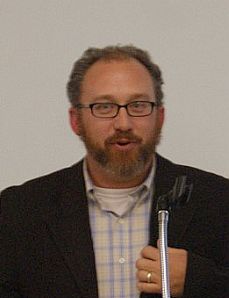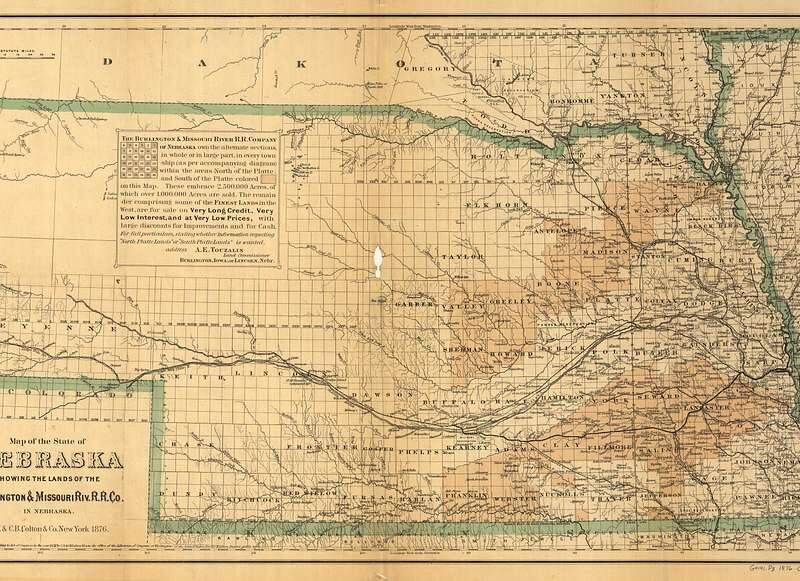Transcript of presentation speech by Robert Brooke, NeWP Director

I am pleased to present the 2014 Nebraska Writing Project Carol MacDaniels Teacher of the Year Award to Daniel Boster.
Dan Boster is a self-proclaimed “activist teacher” at Ralston High School, where he currently serves as English Department Chair. Since participating in his first Summer Institute at Ralston in 2006, Dan has been a mainstay of writing activism in the NeWP network. He’s served as Co-Director and on the Advisory Board. He is the voice behind our Policy Statement on Inclusive and Socially Just Teaching. With Jeff Grinvalds, he facilitated the Urban Justice League in Omaha area schools. Dan co-edited What Teaching Means: Stories from America’s Classrooms with his spouse Marni Valerio, a publication celebrating grassroots teacher advocacy. His current project, nominally for his dissertation research, gathers Nebraska teachers across institutions to study mindfulness as a way of speaking back to the excesses of accountability. In short, Dan Boster engages in activist teaching in his own classroom, throughout his professional network of teachers, and through his own writing. These are exactly the three traits we have honored for the past fifteen years with the Carol MacDaniels Teacher of the Year Award.
Dan Boster’s current students emphasize his commitment to teaching beyond the classroom. In her letter of support, one student wrote:
Unlike most teachers, Mr. Boster was one of the few who tried to prepare us for the world past our high school walls. He could have just taught what was required in the curriculum, but he went beyond. He introduced us to TED Talks and had us engage in deep group discussions. He had us do a yearlong project where the class had to immerse in an environment that we were not familiar with and write about the experience. Without these different approaches to learning, I feel the class would lack awareness of our surroundings.
Another student wrote:
Mr. Boster doesn’t stop teaching when the school day ends. He is always willing to help after school and readily answers our e-mails even on the weekends.
A third student reaches for a metaphor to express Dan’s influence:
Clarity in a time of distress is not a luxury afforded to all those in our present position. We, however, have been given the ability to see more clearly the paths we are to take through the diligent, profound work of Mr. Boster. What he has given us is more than mere clarity though. Mr. Boster has given us the chance to pronounce the great passions that wreath within us; he has helped us forge new ways of thinking.
I think this student’s idea is captured more prosaically in the words of a teaching colleague:
He’s an extraordinary classroom teacher. This I know not just as a colleague but as a parent of two of Dan’s students. Students are better people for having had Dan as a teacher and mentor.
Dan Boster’s colleagues echo these students’ comments about his teaching and mentorship. A clear theme in their support letters is his professional mentorship in the often challenging world of teaching. One NeWP colleague writes:
Dan saw something in me. He pushed me to challenge myself professionally, to get involved, to be a part of the change I wanted to see in my profession. Actually, I think he sees something in most people, and that is the best kind of educator one could ask for. Dan Boster has a gift for helping people to see the best parts of themselves.
This professional mentorship has been recognized by the Ralston School District. I received these comments from an assistant superintendent:
Dan’s expertise in education has helped create a new position at Ralston High School. During the 2014-15 school year Dan will become the first 7-12 Instructional Coach, working to foster networks within Ralston Public Schools that support teachers.
And his Assistant Principal writes:
As a key communicator and teacher leader, Dan Boster uses others’ writing along with his own as a springboard to cause colleagues to think deeply about their practice, engage in critical dialogue aimed at improving teaching and learning, and celebrate success.
As this Assistant Principal notes, Dan’s inspiring mentorship is grounded in his own writing. A core Nebraska Writing Project principle is “the best teachers of writing are writers themselves,” and Dan lives that principle. In fact, he emphasized the necessity of teacher writing in his introduction for What Teaching Means. He explained:
When teachers fail to tell their stories, something crucial is lost. Wisdom wrought from experience is neglected. Like most teachers, I read dozens of articles and books about teaching each year. I look for ways to improve my practice and better serve my students. I continue to go to school myself and am involved in conversations with teachers all over the country. I have learned a great deal from all of this, and I am a vastly better teacher for it. However, I too am guilty of not speaking out enough. This entire [book] project is an effort to allow teachers’ voices to be heard.
As an activist writer, Dan calls on all of us teachers to write to be heard, and he models that activism through his own writing. He’s a published poet and educational author, a seasoned presenter at professional conferences, and I know he’s currently involved in at least two other book projects beyond the 2012 collection What Teaching Means. In fact, it’s Dan’s ethos as writer that first stands out when newcomers to NeWP meet him. His nominator for this award, Jeff Grinvalds, describes Dan’s first impression:
I first met Dan at a Board Retreat. It was my first retreat, and Robert introduced Dan to everyone as a poet. I still have a photograph that I took of him on the lake at the St. Benedict Center. His hair was swept back by the wind, he wore Birkenstocks and had a beard that reminded me of Shakespeare. He was and is a writer. On a writing marathon that day, and at several others that have followed, I have heard Dan read his beautiful verses, and these inspire me to work on my own poetic voice. I’m certain his students at Ralston High School feel the same way.
I’d like to close with a short sample of Dan’s writing. This poem, which I’ve excerpted here for time, comes from Dan’s first NeWP Institute anthology, from Ralston in 2006. I’m intrigued by how this early NeWP writing already captures some of the characteristics his nominating letters describe: an engaged activism that challenges the borders between school and wider society; a nudge toward the professional development of teaching colleagues; and a robust writer’s voice. Here are some verses from Dan’s Poems Don’t Need Morals:
Poetry could sin a little more: covet the metaphors of the poem on the next page, eagerly murder love stories and best-selling novels, make back alley deals with evil muses, sleep on the couch all day, hate prose that gets stuff done, and dance without punctuation in the moonlight. . . . Nights could find poetry screaming out its car window exchanging taunts with magazines and newspapers waiting to be delivered. English students might finally get it if poetry, just once, drove up in an SUV, came into the classroom, and made out with the valedictorian in the front row. Or poetry could continue being good resisting the temptation to let itself go making sure there is always a lesson but never shouting.
Please join me in honoring Daniel Boster as the 2014 Nebraska Writing Project Carol MacDaniels Teacher of the Year.
–Robert Brooke, Director, Nebraska Writing Project
2 May 2014


